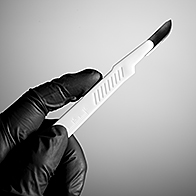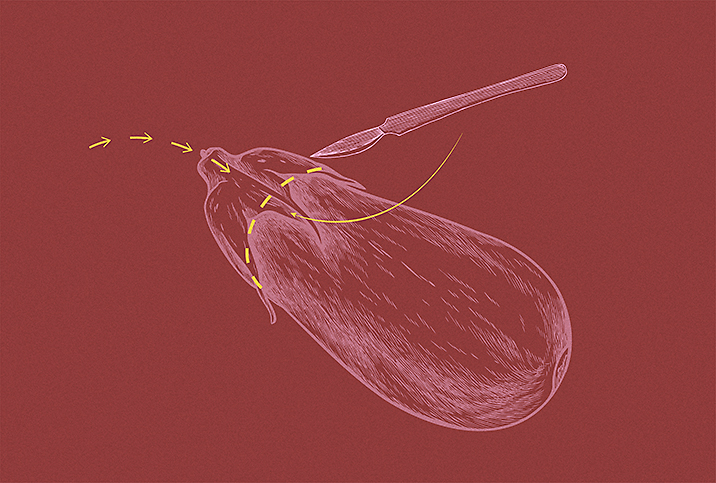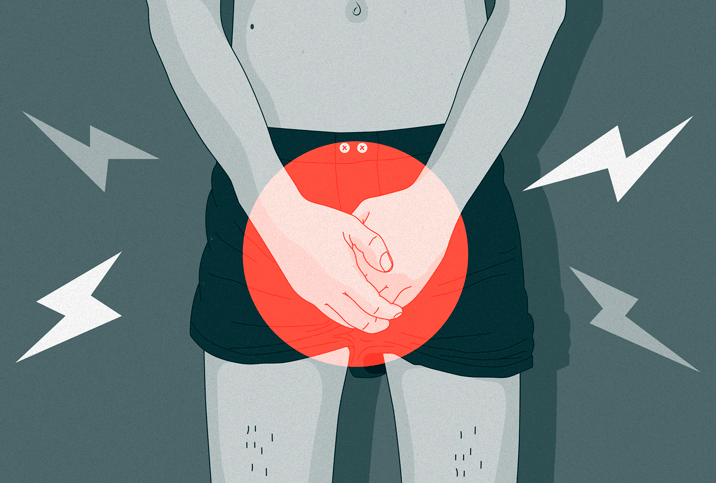How Does it Feel to Get Circumcised as an Adult?

Though men are frequently reluctant to open up about having it or why they had it done, adult circumcision is a surprisingly common procedure. Wrapped up in mystery, adult circumcision may be largely misunderstood by many.
Circumcision of newborns and infants is, of course, a widespread and generally unstigmatized process. The Centers for Disease Control and Prevention (CDC) found that from 1979 to 2010, the rate of circumcision among babies in the U.S. actually dropped from 64.5 percent to 58.3 percent, but remains a decision a majority of parents make in the states, where it's much more common than in other industrialized countries.
What's less talked about are the stories of adult men who have made the decision to remove their foreskin. And yet there's a good chance you know someone who's undergone an adult circumcision, even if you don't realize it. (It's understandably not the kind of thing guys go around casually dropping in small talk.)
"I probably see at least five patients a week every week [for adult circumcision]," NYU Langone Health urologist Seth Cohen said, emphasizing how regular the operation actually is. "I have two circumcisions tomorrow."
Why would a grown man seek circumcision?
While parents generally circumcise their babies for religious reasons or perceived cleanliness ("the data is really still out" on the latter, according to Cohen), there are real medical reasons to get a circumcision as a fully grown man.
One is balanitis, an inflammation of the head of the penis most common among uncircumcised individuals. People with balanitis may suffer chronic infections, often underneath the foreskin. "Immunocompromised or diabetic men" are more susceptible, too, Cohen said, and while every male has bacteria in their penis, the trouble with foreskin comes up for certain men when it traps and holds bacteria.
Another medical condition that may be cause for adult circumcision is phimosis, a condition in which men have trouble pulling back their foreskin because it's tight—which can then subject them to balanitis. Men with phimosis may even get painful tears or cracks in their foreskin when their penis is engorged. "Those are two definite clinical indications" for circumcision, Cohen said.
Then there's what's known as cosmetic circumcision. Men sometimes pursue the procedure for non-medical reasons and may only get partially circumcised for the sake of appearance. Cohen, along with a number of other urologists, doesn't recommend this path to patients.
There are real medical reasons to get a circumcision as a fully grown man.
"I don't even know what [cosmetic circumcision] means," he said with bafflement in his voice. "I'm not sure there's any validity to it. We were never trained to do partial circumcision. It doesn't make a lot of sense."
And while health insurance generally covers adult circumcision, if it's purely elective, coverage may not be available.
Cohen talks frankly with his patients about adult circumcision. Some are "being pushed to do it by a boyfriend or girlfriend for whatever reason," he said. "I really try to talk them out of it. You're doing something cosmetic that's going to have sexual ramifications. It usually doesn't turn out very well."
Additionally, he refuses patients if he feels uncomfortable.
"I don't think you're doing it for the right reasons," he'll tell them. But he's also ready to step in to help patients who are in need.
'Not better or worse, just different'
Men who undergo adult circumcisions tend to be reluctant to share their experiences, but have a wide net of stories of their own reasons and ramifications.
Mark, a 41-year-old contractor in Tennessee, had been dealing with "mild phimosis for years," and decided to get circumcised at 37 after a relationship sparked a more regular sex life. (Names of patients have been changed in this story out of their privacy concerns.) He consulted with a urologist only to later get a call from the associated hospital telling him that because it was an "elective" surgery (despite his medical condition), insurance would not cover it and he would have to pay more than $12,000 upfront (for comparison, infant circumcision generally costs around $250 to $400, according to Allina Health). Finding this "ridiculous," he instead went to an experienced specialist who wouldn't take insurance but performed the circumcision for a relatively affordable $2,500.
Though he did it for mainly medical reasons, Mark isn't shy to admit that "I'd be lying if I said I didn't like the idea of having a better-looking dick," which to him meant being cut. "Uncut penises also have to be cleaned regularly to avoid unpleasant odors." And he "got UTIs every blue moon and discovered that being uncut can cause them."
For Mark, the procedure itself was painless except for the "four or five" times the doctor pricked his penis with a needle filled with a local anesthetic to numb the organ. He could walk and drive after being bandaged up and was sent home with strong painkillers.
Cohen noted that recovery from adult circumcision can take 10 days to two weeks (in contrast, babies recover in about 24 hours because of the smaller size and because infants' wounds simply heal faster). But Mark found that full recovery took him four weeks, and in that time, "I didn't want anyone even touching my penis, let alone sexual intercourse."
The first five days were the most painful: He was fine sitting down, but not so much peeing or walking around. His biggest problem was his relationship with his cats that wanted to cuddle on his lap (he bought a baseball cup and jockstrap—"problem solved!").
Since then, sex and masturbation have been "absolutely" different. Mark enjoyed masturbation more when he was uncircumcised, and it didn't require lube. Sex, however, "is not better or worse, but just different." His penis is "less sensitive, but I also don't have to deal with the feeling that my foreskin is on the edge of tearing." He was "more nervous about the operation than I needed to be," and aside from having to readjust down below more frequently now, he's overall "happy" with the result.
Luke, 33 and from the U.K., had similar reasons for going under the knife: Increasing inflammation of his inner foreskin caused "severe discomfort" and tightening. He also liked the look of a circumcised penis and thought it would be easier to manage. "I was right!" he said.
He paid £500 (about $669 in today's U.S. dollars) for the procedure and was "panicked" at first looking at his new penis, but upon healing, he got used to it. In fact, five months later, he's now "amazed" at the result and wishes he had completed the operation sooner since his health issues lasted eight years.
Sam, who's 46 and was circumcised at 23, has an entirely different tale to tell. Growing up in a white family in California, "everyone else around me had what I considered a nice circumcised penis," he said. "I hated having foreskin. I was made fun of."
His self-consciousness led him to get the procedure—there were no preceding medical issues. Insurance nevertheless stepped in, and "it was worth every penny!" He's since gotten a second circumcision to remove the frenulum, where the foreskin meets the underside of the penis. He currently possesses the "pretty penis that I always wanted and wished I had when I was born," he said.
The point is there's no single motivation for getting an adult circumcision. Mark thinks "it's a shame this isn't discussed in the same vein of girls getting boob jobs" (which can also be for cosmetic or medical purposes). Cultural firestorms still engulf the topic of circumcision of any kind. But if you're thinking of getting circumcised as an adult man, seeking professional medical expertise is key. So are consultations and asking plenty of questions.
"You're only born with one penis," Cohen said. "If you fuck up that penis, there's no going back."




















